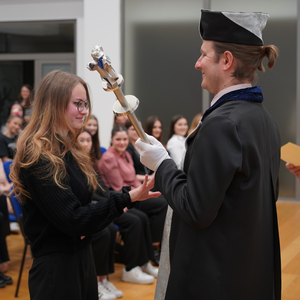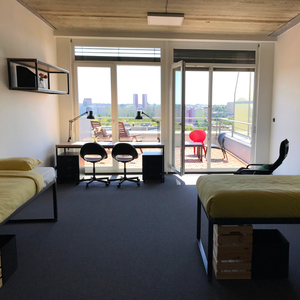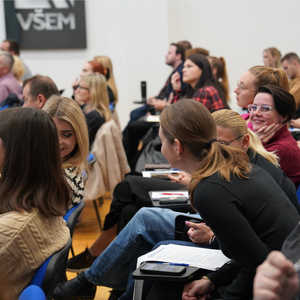Glossary VŠEM
Glossary of terms is used for a basic orientation of the applicant/student at the University setting and administration of studies at the University of Economics and Management (form and organization of studies, organization of University, enrollment, tutorial, annotation and literature, studying, student information system).
Forms and organization of studies
-
Full-time form of studies - lessons take place on weekdays (Monday - Friday) and it is expected a regular participation at lectures, seminars and consultations, or other education activities.
-
Part-time form of studies (earlier also remote) - a combination of full-time and part-time form of studies, with less direct teaching. Student attends school, within the educational focus (lectures, seminars and tutorials),several times per trimester, usually on weekends.
-
Distance form of studies - takes place without direct instruction (without lectures and exercises. Instruction with self-study and consultation with the lector. For both traditional and nontraditional students, distance education provides access to educational opportunities and resources. Whether self-paced or scheduled, online classes give you greater flexibility and more options for completing a degree or pursuing your interests.
- Interuniversity form of studes - possibility to study at two universities at the same time.
-
Bachelor program - 3-year study program, which provides for a student basic sector/interdisciplinary knowledge. Graduates of bachelor's degree programs will get the academic degree (Bc.).
- The Master´s program - it´s a program usually for a 5 years. Students will gain a specialized knowledge of the area. For a graduates economic study programs are awarded the academic title of Engineer (Ing.)
- Following Master´s program - usually for a 2 years. Following the bachelor's degree. For adoption is compulsory to have at least the first level of university education (Bc.).
- Doctoral form of studies - usually 2 years program. For doctoral study program, a student must obtain a second level of university education (Ing., Mgr.) Graduates will be awarded the title of Doctor (DBA).
Who is who at the University
- Rector - chief of the University, some of the activities is represented by pro-rectors.
- Pro-rector - representative of the Rector for individual areas and issues of the University (studying, education and research, international relations).
- The hierarchy of titles - academic degrees, according to the educational attainment of vocational education of University: Bc. (Bachelor)/ Mgr. (Master) /Ing. (engineer) / PhDr., Mgr., RNDr. (Doctor) /Ph.D. (Doctor) / Doc. (docent) / Prof. (Professor).
- Academic institutions (institutes, departments) - workplace at the University, where teachers work within their own sectoral specialization. VŠEM is divided into the Institute of Economics (Department: Economics/Business Economics/ Computer Science and Quantitative Methods) and Management Institute (Department: Management/Marketing/ Human Resource Management).
- Department of research - workplace within University, which is focused for a scientific and research activities. Centre for Economic Studies of University of Economics and Management (CES VŠEM) has sponsored research activities of the University of Economics and Management.
- Administrative office (department) - departments, which are responsible for running the organization by administratively (Study department - study agenda, Rectorate - agenda of the rector and pro-rectors).
-
Sport - The university sports club at the University of Economics and Management (VSK VŠEM) brings together all students, without limitation sports industry; University Sports Club of the University of Economics and Management (USK VŠEM) athletic club from the University of Economics and Management (1.st League).
Before the tuition
- Statement of the study at university - (Index), records all results/outcomes during the study graduate student in the academic year, (successful, unsuccessful). At VŠEM this index has an electronic form and it is a part of student information system (SIS).
- Student identification card - (student ID) - important identification card of the student, which is used for: authentication to the eams, lessons, tuition, for administrative tasks related to studies. To issue a license, must upload an electronic photograph in the required format to SIS VŠEM/Files applicant/student.
-
Credit system - assigns to each subject a numerical value (credit), and on the basis of its difficulty (evaluate, how the exam was difficult). To complete the study, it is necessary to obtain the required number of credits. Some of the Universities requires the fulfillment of credits in academic years.
-
European Credit Transfer System (ECTS) - has an international status, which allows to study part of their studies abroad. Student after returning home may have some items recognized.
-
Canteen - it´s dining room for the students. (VŠEM has not own canteen, students can use other canteen from other Universities. The private University have not eligible for the subsidy for meals.
- Library - there are learning and expandind literature, seminar, bachelor and diploma thesis of students(graduate). For students of VŠEM is available library VŠEM, library CES VŠEM and CERGE-EI.
-
CERGE-EI - the professional library of the Academy of Sciences of Charles University in Prague. After completing and confirmations the application to the library CERGE-EI is for student in the seat of library glued a barcode on the back side of student identification card (when student card also serves as a library card, validity is extended in the administrative record).
- PC study - room with computer technology and Internet access. Entry into the study is only possible with identification student card VŠEM.
Enrollment
-
Enrollment - Enrollment is administrative process, which every appliacant (1st year) or student (2nd - 3rd year) at University will must attend. By this act, the applicant becomes a student. Student confirms its interest in the continuation of studies in the next year at Universtiy. VŠEM distinguishes two types of registration: electronic (applicants, students) and administrative (applicants).
-
Electronic enrollment (applicants)- applies to applicants, who met the conditions and administrative formalities of admission procedure VŠEM.
-
Electronic enrollment (students) - enrollment for the academic year (trimester) applies to all students at VŠEM, who at the time of enrollment have not closed electronic learning. Student signs up through student system a study subjects (module) for next academic year.
-
Conditional registration - student is enrolled to the academic year without the composition of partial exams and seminar papers, according to the schedule of studies (schedule).
-
Regular enrollment - student is enrolled to the academic year after passing all partial exams and seminar papers, according to the schedule of studies (schedule).
-
Administrative enrollment to the 1st year - for the new students takes places depending on the date of study (October, January, April) within in an introduction to the study (1st education camps), student must complete administrative tasks (issuing student ID, student declaration, certificate of study, takeover of study literature).
-
Introduction to the Study - introduces with the conditions and administrative formalities of studies at VŠEM. Teaching and examination camps, teaching schedule, method and inspection requirements of study, a student information system, internal regulations; part of the administrative registration for candidates (new students).
-
Matriculation - it is adminitrative act, when the student 1st year is officialy recognizec as a full member of Univerzity. Student got matriculation charter and Matriculation act je for all students obligatory.
Tuition
- Education camps - includes tuition of the course (lectures, seminars, exercises, consultations).
-
Lecture - interpretation by lecturer to the study subjects with the physical presence of the student, when attendance at lectures is not obligatory. At the lecture are used study materials for a given subjects (textbooks, study support, study text). Students will be familiar with the issues of the course at the lecture, that they can decoded the basic terminology.
- Exercises - practicing theoretical knowledge within tuition, when exercises complements standard practice teaching. Some exercises require the preparation of the student in the form of worked examples.
-
Seminar - specific and more individually oriented style of learning additional lectures (can be individual or team). Participation in the seminar requires prior preparation of the student (worked examples, case studies, presentations).
-
Consultation - are used within preparation for the exam or seminar work.
- Obligatory subject - graduation obligatory subjects is mandatory for a study.
-
Obligatorily optional subject - object, that is part of a block of study and the student can choose from the available options.
-
Optional subjects - the subjects open to the University beyond programs; can be completed by examinations or assessments. The subjects open at the University beyond programs; can be completed at the examinations or assessments.
-
Study module - set of industry-related study subjects, taught in a given timeframe (trimester).
-
Seminar block - contect of seminar block are the individual focus of seminar block. Seminar block is part of the Bachelor's degree program and the master's program, part of the seminar block are practical applications.
-
Practical applications - practical applications are part of the seminar block. PA are terminated by credit. Aim of practical applications is to introduce students to full-time form of studies, with realities of business practice (corporate internships, field trips, meetings with experts).
- Trimester/Semester - academic year at VŠEM is divided into three trimesters, when one trimester lasts four months and the student may attend exams during the whole trimester. Majority the part of universities in the Czech Republic is divided into semesters academic year (two per academic year).
Annotation of subjects/Module and literature
-
Annotation - content and objectives of the course, which are required as output knowledge, reported basic and exporting literature, internet links and specialized periodicals, themes of seminar papers.
-
Basic literature - which is necessary for basic knowledge output, to study the subject (reported in annotations).
- Expansion literature - which is used to supplement the output of knowledge, to study the subject.
- Professional periodicals - journals published as a periodical publication in printed or electronic form, which is for complement the output of knowledge, to study of the subject.
-
Web links - A list of websites, related to the subject.
-
Videolearning VŠEM / E - books - includes the courses, teaching and study texts, study materials, workbooks, and presentations in electronic form.
Study (process, control, closure and termination)
- Rating of the system - basic division (comply, failed), the scale of classification (1- excellent, 2 - very good, 3 - good; 4 - failed), credit (included, excluding), recognition of the course (rerognized, not recognized), standard scores of VŠEM (0-50% : 4 - failed/ 51-70% : 3 - good/ 71-90% : 2 - very good/ 91-100% : 1 - excellent).
- Examination period -exams are of the course of all academic year, according to the administrative guidelines for the academic year.
- Exam - classified output from the study subject is used to control the output of student knowledge in a given subject, the exam can be at the oral, written or combined form.
- Credit - one of the method completion of continuous endings of the course, which is graded by the higher academic scale (included, excluding). Credits are not part of the student's schedule and credits are the full responsibility of the guarantor of the course/module forms of credit (continuous test, trimester papers, essays, case of studies, presentations). The composition of the credit are usually determined by the possibility of a subsequent exam of the study subject (student must have a credit, to be able to complete examination test).
- Examination test - written output from the study subject, which is classified by higher academic scale (excellent, very good, good, failed).
- continuous exam - written output for monitoring of basic knowledge for the study subject, written exams are not part of the student's schedule and they are the full responsibility of the guarantor of the course/module. If the student does not pass the continuous exam, must develop alternative variant for the control of continuous knowledge (written work, essay, presentation, case of study).
- Presentation - public performance of the independent work (individual or collective), before the auditor.
- Seminar paper - single, written output of the student, within the range of pages according to the administrative instuctions of the schools. Student presents and defends seminar paper before the commission, SP is classified by higher academic scale (excellent, very good, good, failed).
- (State) Final Exam - file of exams, which are necessary for graduation. Final exam, students can already to compose, during their studies, if they passed all exams given of study subjects.
- Closing study - date of composition of all partial exams and seminar papers, for the study program. Student have to concluding the studies into to standard length of the relevant study program.
- The completion of studies - includes a closure study, the composition of final exams and defending a thesis (bachelor/master).
- Interruption of studies - student can apply during the study about the interruption of studies for a period of 12 months. At the time of interruption, the applicant is not a student (not entitled to participate in the teaching and examination focus) and does not have access to student information systém.
- Leaving of studies - student can leaving of studies of their own accord.
- Completion of studies - study is completed, if the student fails to comply with conditions (Inner rules and guidelines) for continuing of studies.
- Exclusion from the studies - student can be expelled from the study, if he break the conditions laid down by the internal regulations of the school.
- The conditional of exclusion - the student is definitely excluded, if he does not fulfill a conditions to the certain date.
- Exclusion - the opportunity to appeal within 30 days.
- Individual Study Plan/reduction of courses - individual arrangement of the study, that allows to the students to reduction/extension the standard period of the studies, according to their specific requirements.
- Tuition of the foreign language - students chooses their compulsory foreign language (between English or German). non-compulsory, optional languages: French, Spanish, Russian and Italian language.
Student Information System (SIS)
- Administration of the student - overview of all sent study forms, including relevant responses.
- E-index - summary of all results, outcomes during the study, which the student graduated in the academic year (successfully, unsuccessfully), (credits, exams, seminar papers, final examination, defense of the BP/DP).
- Cassification overview - is part of the E-Index, compares mandatory structure of the studies with successfully absolved results for the E-index.
- E-application - include teaching and study texts, educational support, workbooks and presentations in electronic form, Videolearning of VŠEM, Videomanuals.
- E-books - are electronic versions of printed textbooks of VŠEM, to study the subject with specific requirements for distance learning (self-study) and the highest "series" learning and teaching materials of VŠEM.
- E-learnings applications - English, study subjects/modules are designed for on-line testing knowledge and repetition of the study subjects/modules within the studies of relevant study programs/courses.
- E-files - contain files for downloads (application forms, scholarship applications, administration of the studies, administration of the control of studies, the front page of the compensatory /seminar/Bachelor's/Master's thesis for graduate programs).
- E-texts - include study texts for full-time fornm of studies of the course, or educational support as a complement to study a given subject (if not available learning text).
- Study text -Study text complements the study literature, depending on the specific characteristics of full-time form of studies, when within the study modules/courses are available materials presented on tuitions.
- Educational support - has a single structure of the own text and adds a textbook or a selected part (chapters), which is not designed for self-study.
- Calender the tuition and exam - overview of all tuitions and examination concentrated within specific deadlines regardless of study program/field or form of studies.
- Schedules and exams of the student - includes references, reviews and component related to the control of studies (overall a chronological overview executed a classified exams, overview of schedules and written exams of the students, link to log on examination period/ Out of the examination period, general overview of teaching and examination of concentration for a given period, overview and login theme of thesis, implementation of electronic enrollment for the period.
- Files of the applicant/studetn - files uploaded by administrative and pedagogical work of VŠEM (the contract about studies, administrative notification, administrative/study department, advance and tax documents) and the applicant/student of VŠEM (photos, seminar, credit and thesis, attachments sent via SIS VŠEM/Study form, previews of completed exam).
- Study form - primary means of communication between the student and the relevant administrative departments (Bachelor/Diploma thesis, confirmation of studies, seminar paper, scholarships/Erasmus, study literature/texts, topic of the BP/DP, recognition of a course/exam, written work, request/question.
- The date of the applicant/student - items associated with the administration of the student (summary of sent/answered study forms, log on to the VŠEM beyond the student´s schedule, complete overview of the student attendance) and the information, that a student/applican can update, for acces to the SIS (personal and contact information, change passwords for acces to the SIS, specifying an alternative mail messaging from SIS VŠEM, overview received basic literature within administrative enrollment, employer of the student and his job.
- Webforum - offline discussions with the administration or with the academic employee.
- Webmail - student´s e-mail in the form of name.surname@studentvsem.cz, are sent information of VŠEM (changes, notifications, updates, evaluation of exams and seminar paper).
- Reporter VŠEM - overview of administrative, organizational and study information for students of the University of Economics and Management, in the form of student´s reporter of VŠEM (it usually based each trimester).








